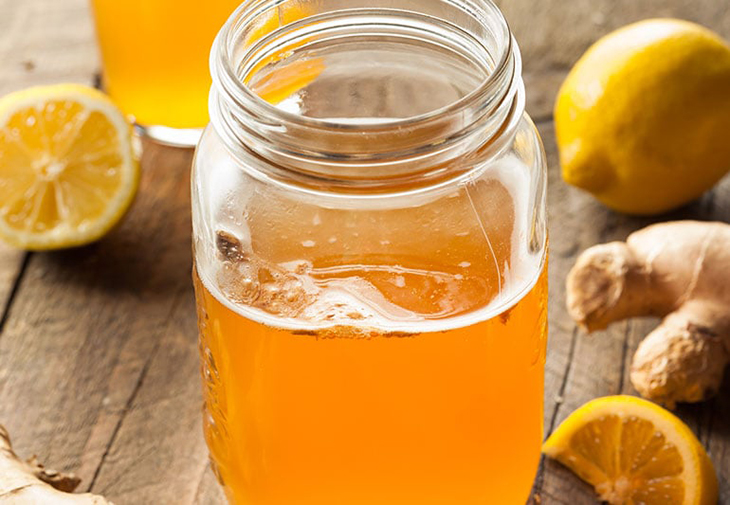
During the process of kombucha fermentation, a thick and jelly-like film known as a SCOBY develops on the liquid’s surface, which can be utilized for creating more batches of the fermented tea. A recent small-scale study highlights the potential benefits of this effervescent fermented tea in lowering glucose levels.
The popular fermented beverage, kombucha, might aid individuals with type 2 diabetes in managing their blood sugar levels.
As reported on August 1 in the journal Frontiers in Nutrition, a study revealed that participants with type 2 diabetes who consumed kombucha regularly for four weeks exhibited lower fasting blood glucose levels compared to when they consumed a similar-tasting (though slightly less tangy) placebo beverage.
“The study is promising and interesting, because a drink that actually has sugar in it may potentially lower blood sugar,” said a study author, Dan Merenstein, MD. He is a professor of human sciences in Georgetown’s School of Health and of family medicine at Georgetown University School of Medicine in Washington, DC.
“When participants took a placebo [drink], their blood sugar went down but not that significantly. But when we gave kombucha to the same people — with the same microbiome, the same genetics, and same diet — their blood sugar levels went down impressively,” added Dr. Merenstein. He worked by collaborating with scientists from the University of Nebraska in Lincoln and MedStar Health, the latter of which is a nonprofit healthcare organization.
The Higher the Kombucha Consumption the Lower Blood Sugar Drops
In this research study, 12 adults diagnosed with type 2 diabetes, averaging 57 years of age, were recruited. Among them, nine were female, with half the participants being African American and the other half white. Each participant was directed to consume 8 ounces of a designated study beverage with their dinner daily, adhering to this routine for four weeks.
During a specific four-week period, participants were given either kombucha or a placebo to drink. After an eight-week hiatus intended to eliminate the lingering effects of the beverages, they switched to the alternate drink for another four weeks. It’s crucial to note that participants remained unaware of which beverage they were consuming throughout the study.
Throughout the study, participants recorded their daily fasting blood glucose levels, measured through a home finger-stick glucose meter before their morning meal. This time was chosen because it aligns with the common practice of individuals with diabetes monitoring their blood sugar levels.
Upon consuming kombucha for four weeks, participants experienced a notable decrease in their average fasting blood glucose levels, dropping from 164 to 116 milligrams per deciliter (mg/dL). In contrast, when they consumed the placebo for the same duration, the average fasting blood glucose levels decreased from 162 to 141 mg/dL, a change that did not reach statistical significance.
According to the guidelines provided by the American Diabetes Association, adults with diabetes should ideally maintain fasting blood glucose levels between 80 to 130 mg/dL, making the reduction observed in the kombucha group particularly significant.
Kombucha Was Not Designed to Reverse Type 2 Diabetes
The research indicates a potential connection between drinking kombucha and enhanced fasting blood sugar levels. However, Dr. Marilyn Tan, an endocrinologist at Stanford Medicine in California who was not part of the study, emphasizes that the findings did not prove the reversal or resolution of diabetes in any patients.
“This was a very small study, and though it showed an encouraging improvement in fasting blood sugars, we don’t have data on glucose levels throughout the rest of the day [only at one time during the day],” Dr. Tan said. Her main clinical interests are outpatient and inpatient diabetes management.
“Diabetes is difficult to reverse, and it depends on the type of diabetes and other contributing factors — for example, other medications that may raise glucoses or the risk of other health conditions like pancreatic disease.”
A Closer Look at the Active Ingredients of Kombucha
Apart from analyzing kombucha’s impact on blood sugar levels, the researchers investigated the composition of fermenting microorganisms in the beverage to identify the most active ingredients. They discovered that the drink primarily contained lactic acid bacteria, acetic acid bacteria, and a yeast variant called Dekkera.
The exact process that leads to reduced blood sugar remains unclear, but Tan suggests that these ingredients might be associated with alterations in the gut microbiome or other cellular-level metabolic changes.
The authors of the study propose that the beneficial effects could be attributed to both microbes and metabolites present in kombucha, including ethanol, lactic and acetic acids, tea components, and flavoring elements.
The Long History of Kombucha with Regards to Health
Kombucha, a popular fermented beverage, is crafted from a blend of brewed black or green tea and sugar, undergoing a process akin to vinegar fermentation. The key ingredient here is the SCOBY, or symbiotic culture of bacteria and yeast, which forms on the liquid’s surface during the tea’s fermentation process. Similar to how a sourdough starter expedites bread-making, the addition of a SCOBY accelerates the kombucha production.
The production process of kombucha is intricate. Initially, yeast ferments sugar into alcohol, which then undergoes a bacterial fermentation, transforming the alcohol into acetic acid. This combination of acetic acid and water constitutes vinegar. Notably, the alcohol and acetic acid content in kombucha is minimal, typically remaining below 1 percent, as outlined by the Pennsylvania Department of Agriculture.
Originating in ancient China, kombucha has been revered for its potential medicinal benefits for centuries. Recent research, featured in the May 2020 edition of Antioxidants, has shed light on its remarkable antioxidant properties. Antioxidants, compounds present in various foods, have the potential to reduce inflammation and safeguard the body from harm.
Although the aforementioned study had limitations, involving only a dozen participants, the findings serve as a foundation for more extensive research. Dr. Merenstein and his team, while acknowledging the study’s constraints, express the need for subsequent investigations encompassing larger participant groups and longer durations.
It’s worth noting that the beverages used in this research, both the kombucha and the placebo, were provided by Craft Kombucha, a commercial manufacturer in the Washington, DC region. This association might raise concerns about bias. However, Dr. Merenstein emphasizes that none of the scientists involved received any financial compensation from this company, underlining their commitment to scientific integrity.
Until more research can be conducted, the true benefit of kombucha remains to be seen, Tan said.
“Kombucha is not a replacement for diabetes treatments recommended by your healthcare provider,” she then added.
Merenstein said that someday kombucha could be an adjunct to help those diagnosed with prediabetes or those who already have diabetes. “Hopefully in the future, but we’re not there yet,” he stated.



